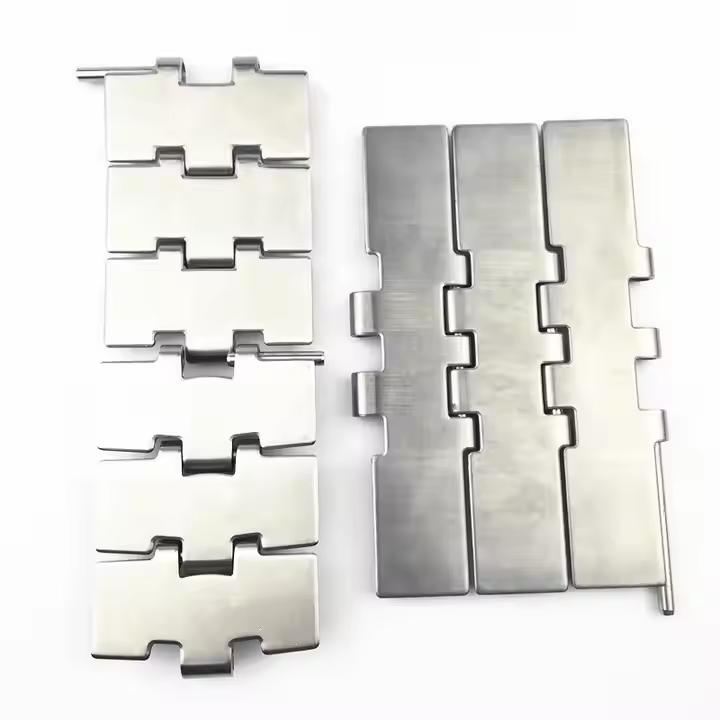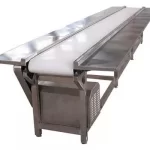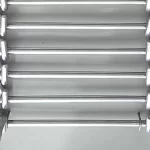Slat Chain Conveyor
Slat conveyor chains are the unsung heroes of heavy-duty material handling, powering industries from automotive assembly to food processing. If you’re looking for a robust, versatile solution to move bulky or irregularly shaped items, this is your go-to system. Let’s dive into the nitty-gritty of slat conveyor chains—think of this as your quick, no-nonsense guide to what makes them tick, why they’re awesome, and how they fit into real-world setups.
The real strength of a slat chain conveyor lies in its toughness and flexibility. It’s built to handle abrasive, oily, hot, or jagged parts that could damage belts or rollers. The slats can be customized by material, shape, and width, offering excellent support for items like automotive components, heavy machinery casings, engine parts, and even pallets or drums.
Key Technical Specs to Know
Here’s the meat of what you need to understand about slat conveyor chains. These specs are grounded in real-world designs and vary based on application, but this gives you a solid starting point:
Material Options:
Carbon Steel: Affordable, strong, great for general industrial use like warehousing or aggregate handling. Think 1,000–2,000 N/mm² tensile strength.
Stainless Steel (304/316): Corrosion-resistant, perfect for food processing or chemical plants. Ideal for wet or acidic environments.
Thermoplastic/Acetal: Lightweight, low-friction, and FDA-compliant for food and beverage industries. Often used in high-speed bottling lines.
Slat Dimensions:
Width: 100 mm to 2,000 mm, depending on the load. Narrow for small parts, wide for pallets or car chassis.
Thickness: 3–10 mm for steel slats; 10–20 mm for plastic. Thicker slats handle heavier loads but add weight.
Chain Pitch: Common pitches range from 25.4 mm (1 inch) to 100 mm. Smaller pitches mean smoother movement; larger ones handle heavier loads.
Load Capacity: Anywhere from 500 kg to 10,000 kg per meter, depending on chain design and motor power. Heavy-duty systems for automotive can hit 20 tons with reinforced chains.
Speed: Typically 0.1 to 1 m/s. Slower for precision tasks like assembly; faster for bulk material transfer. Variable-speed drives are common for flexibility.
Temperature Range: Steel chains: -20°C to 400°C (special alloys for extreme heat).
Plastic slats: -10°C to 80°C, limited by thermal expansion.
Lubrication Needs: Self-lubricating plastic chains for clean environments (e.g., pharmaceuticals).
Grease or oil for steel chains in dusty or high-load setups. Automated lube systems are a game-changer for maintenance.
Competitive Advantages:
- Packaging
- Price
- High Product Performance
- Prompt Delivery
- Quality Approvals
- Reputation
- Service
- Small Orders Accepted
- Study construction
Why Choose Slat Conveyor Chains?
Slat chains aren’t just another conveyor option—they’re built for jobs where other systems flop. Here’s why they’re a big deal:
Handles the Weird Stuff: Got oddly shaped parts, super-heavy loads, or hot materials? Slat chains don’t care. They’re stable and customizable, so your 500°C engine block or jagged metal scrap moves without a hitch.
Modular and Flexible: Need a curve, incline, or custom path? Slat chains can be designed with tight-radius turns or vertical lifts. You can even swap out slats for different tasks without replacing the whole system.
Low Maintenance, High Uptime: With fewer moving parts than roller conveyors and no belt stretching, these systems are built to last. Stainless steel options laugh off rust, and modular slats mean quick repairs if something breaks.
Clean and Compliant: In food or pharma, hygiene is king. Stainless or plastic slat chains are easy to clean, resist bacteria, and meet FDA or EU standards. No crevices for gunk to hide.
Real-World Applications
Slat conveyor chains are everywhere, quietly keeping industries moving. Here’s where they shine:
Automotive: Moving car bodies through assembly lines. Heavy-duty slat chains handle 2-ton chassis while keeping precise alignment for robotic welding.
Food and Beverage: Transporting bottles, cans, or frozen goods. Stainless steel or plastic slats ensure hygiene and handle high-speed sorting.
Logistics: Pallet handling in warehouses. Wide slat chains move 1,000-kg pallets with zero slippage.
Recycling: Sorting and moving scrap metal or plastics. Rugged steel slats withstand sharp edges and abrasive materials.
Aerospace: Precision transport of large components like wing sections. Low-vibration chains ensure delicate parts stay safe.
Slat Conveyor Chains are very widely used in Industry for various Material Handling Applications in Industries like Fertilizers, Cement, Sugar, Mines and lot of other industries wherever there is automation in handling of materials.
We offer a premier Slat Conveyor Chain, which are available in wide choice of configurations. To manufacture this offered range our professionals make use of qualitative raw material. Optimum quality raw material are used in the fabrication to meet varied specifications in an efficient manner and affluent manner. Patrons can avail these in various sizes and other specifications as per clients requirements. The offered Chains offered by us find wide application in various industries and sectors. Moreover, our team of experienced members manufacture the entire range as per various defined parameters to ensure their adherence with international standards and guidelines.



